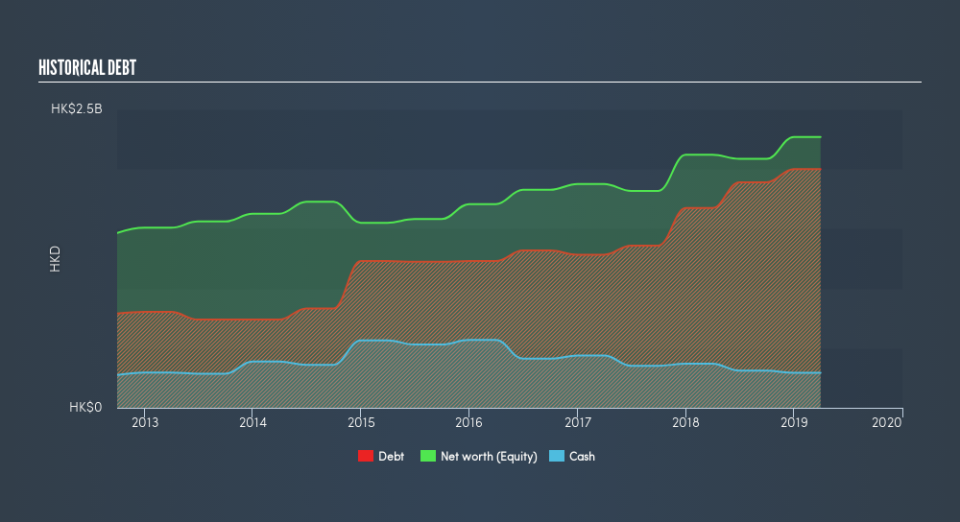Kwoon Chung Bus Holdings (HKG:306) Takes On Some Risk With Its Use Of Debt

The external fund manager backed by Berkshire Hathaway's Charlie Munger, Li Lu, makes no bones about it when he says 'The biggest investment risk is not the volatility of prices, but whether you will suffer a permanent loss of capital.' So it might be obvious that you need to consider debt, when you think about how risky any given stock is, because too much debt can sink a company. We note that Kwoon Chung Bus Holdings Limited (HKG:306) does have debt on its balance sheet. But the more important question is: how much risk is that debt creating?
When Is Debt A Problem?
Debt and other liabilities become risky for a business when it cannot easily fulfill those obligations, either with free cash flow or by raising capital at an attractive price. Ultimately, if the company can't fulfill its legal obligations to repay debt, shareholders could walk away with nothing. While that is not too common, we often do see indebted companies permanently diluting shareholders because lenders force them to raise capital at a distressed price. Of course, debt can be an important tool in businesses, particularly capital heavy businesses. When we think about a company's use of debt, we first look at cash and debt together.
Check out our latest analysis for Kwoon Chung Bus Holdings
How Much Debt Does Kwoon Chung Bus Holdings Carry?
The image below, which you can click on for greater detail, shows that at March 2019 Kwoon Chung Bus Holdings had debt of HK$2.00b, up from HK$1.68b in one year. On the flip side, it has HK$293.0m in cash leading to net debt of about HK$1.71b.
How Healthy Is Kwoon Chung Bus Holdings's Balance Sheet?
We can see from the most recent balance sheet that Kwoon Chung Bus Holdings had liabilities of HK$2.08b falling due within a year, and liabilities of HK$960.2m due beyond that. Offsetting this, it had HK$293.0m in cash and HK$304.6m in receivables that were due within 12 months. So it has liabilities totalling HK$2.44b more than its cash and near-term receivables, combined.
Given this deficit is actually higher than the company's market capitalization of HK$1.82b, we think shareholders really should watch Kwoon Chung Bus Holdings's debt levels, like a parent watching their child ride a bike for the first time. In the scenario where the company had to clean up its balance sheet quickly, it seems likely shareholders would suffer extensive dilution.
We measure a company's debt load relative to its earnings power by looking at its net debt divided by its earnings before interest, tax, depreciation, and amortization (EBITDA) and by calculating how easily its earnings before interest and tax (EBIT) cover its interest expense (interest cover). This way, we consider both the absolute quantum of the debt, as well as the interest rates paid on it.
Kwoon Chung Bus Holdings's debt is 2.9 times its EBITDA, and its EBIT cover its interest expense 4.2 times over. This suggests that while the debt levels are significant, we'd stop short of calling them problematic. On the other hand, Kwoon Chung Bus Holdings grew its EBIT by 29% in the last year. If sustained, this growth should make that debt evaporate like a scarce drinking water during an unnaturally hot summer. There's no doubt that we learn most about debt from the balance sheet. But you can't view debt in total isolation; since Kwoon Chung Bus Holdings will need earnings to service that debt. So if you're keen to discover more about its earnings, it might be worth checking out this graph of its long term earnings trend.
Finally, while the tax-man may adore accounting profits, lenders only accept cold hard cash. So it's worth checking how much of that EBIT is backed by free cash flow. Over the last three years, Kwoon Chung Bus Holdings saw substantial negative free cash flow, in total. While that may be a result of expenditure for growth, it does make the debt far more risky.
Our View
On the face of it, Kwoon Chung Bus Holdings's level of total liabilities left us tentative about the stock, and its conversion of EBIT to free cash flow was no more enticing than the one empty restaurant on the busiest night of the year. But on the bright side, its EBIT growth rate is a good sign, and makes us more optimistic. Looking at the bigger picture, it seems clear to us that Kwoon Chung Bus Holdings's use of debt is creating risks for the company. If everything goes well that may pay off but the downside of this debt is a greater risk of permanent losses. Given Kwoon Chung Bus Holdings has a strong balance sheet is profitable and pays a dividend, it would be good to know how fast its dividends are growing, if at all. You can find out instantly by clicking this link.
If you're interested in investing in businesses that can grow profits without the burden of debt, then check out this free list of growing businesses that have net cash on the balance sheet.
We aim to bring you long-term focused research analysis driven by fundamental data. Note that our analysis may not factor in the latest price-sensitive company announcements or qualitative material.
If you spot an error that warrants correction, please contact the editor at editorial-team@simplywallst.com. This article by Simply Wall St is general in nature. It does not constitute a recommendation to buy or sell any stock, and does not take account of your objectives, or your financial situation. Simply Wall St has no position in the stocks mentioned. Thank you for reading.

